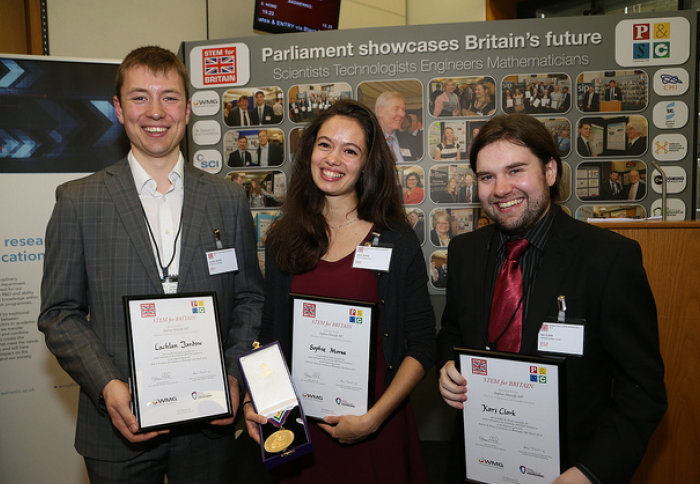Parliament prowess, school science, and IChemE elections: News from the College

Imperial PhD student Sophie Morse, middle, won top prize in Parliament research competition STEM for Britain
Here’s a batch of fresh news and announcements from across Imperial.
From prize-winning posters to presidential prowess, here is some quick-read news from across the College.
Parliamentary prize winner
Biomedical Engineering PhD student Sophie Morse from our Department of Bioengineering won the Westminster

Medal last week – the top prize available at the STEM for Britain 2019 contest. She competed with 44 other early-career STEM researchers from across the country exhibiting posters on their research in Parliament.
Sophie, whose poster explained how to get drugs to the brain using ultrasound and microbubbles, also won the Gold Medal for the best poster in the Engineering category.
She said: “Events like this are important for politicians to get a broad view of what engineers are doing across the country, while also allowing us engineers to also get an insight into what opinions and questions are raised by politicians about research.”
Presidential Professor

Professor Stephen Richardson, Emeritus Professor at our Department of Chemical Engineering, has been announced as the new President of the Institution of Chemical Engineers. He will become Deputy President in May, and full President in November 2019.
Professor Richardson has held several positions at the College, including Head of Chemical Engineering, Dean (then called Principal) of Engineering, Deputy Rector and Associate Provost.
In 2015, he was awarded a CBE for his services to the profession.
Professor Richardson said: “I have been lucky to have had a fulfilling career in chemical engineering that has brought me into contact with many highly talented and motivated engineers. There are a great many challenges facing society today and while all disciplines have a role to play in providing solutions, I believe that chemical engineers are uniquely placed, as systems thinkers, to help ensure that the best solutions are chosen.”
Cells behaving badly
 Genetically identical cells can behave in very different ways. A research team led by Imperial and the University of Edinburgh has now investigated how single cells can display different metabolism – the rates at which they process nutrients into energy and building materials.
Genetically identical cells can behave in very different ways. A research team led by Imperial and the University of Edinburgh has now investigated how single cells can display different metabolism – the rates at which they process nutrients into energy and building materials.
Previously, metabolism was thought to follow ‘deterministic’ rules – if you know the starting conditions of a reaction, you can calculate the outcome. The new research however suggests that bacterial metabolism can behave ‘stochastically’ – there is some randomness in the process.
Using stochastic analysis, the team found that because of this bacteria colonies can split into subpopulations with different metabolic activities. The new findings could help understanding why bacterial clones grow at different rates or tolerate drugs differently.
Read the full paper in Nature Communications Biology.
School science
The Institute for Research in Schools (IRIS) celebrated its third birthday this

week with a showcase at the Francis Crick Institute. IRIS grew out of an initial experiment by Becky Parker, the Head of Physics at a Kent boy’s school, and Professor Steven Rose from our Department of Physics, who trialled getting the school students involved in real university-level research projects.
The scheme expanded into IRIS, a national network of more than 200 UK schools participating in real research often based on large datasets. Students from across the country presented their research at the celebration event, on everything from genomics to the benefits of nature and particle physics.
–
Want to be kept up to date on news at Imperial?
Sign up for our free quick-read daily e-newsletter, Imperial Today.

Article text (excluding photos or graphics) © Imperial College London.
Photos and graphics subject to third party copyright used with permission or © Imperial College London.
Reporter
Caroline Brogan
Communications Division
Tom Rutland
Communications and Public Affairs
Hayley Dunning
Communications Division